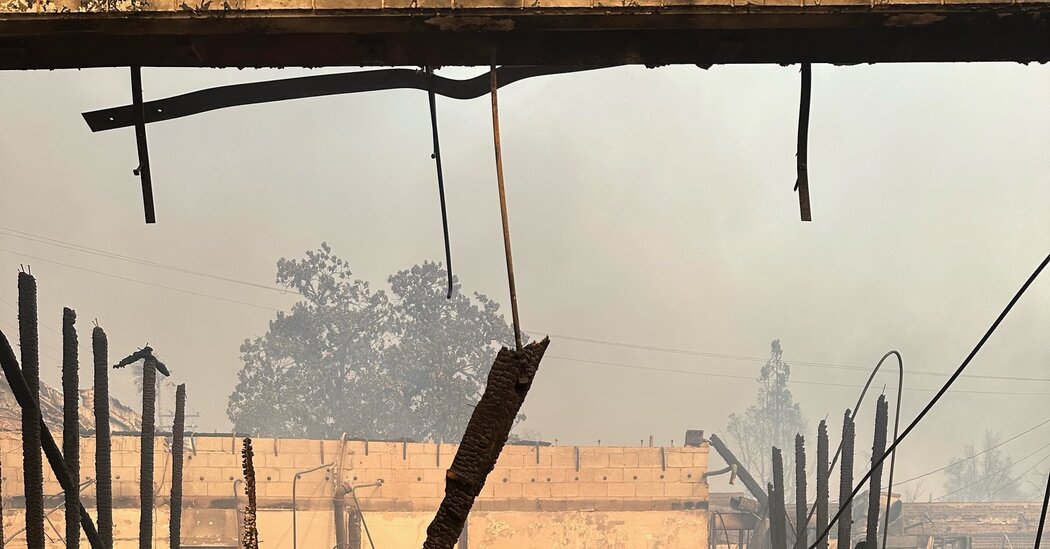It took almost ten years for Cody Wellema to perfect his dream hat shop.
It took one night to reduce it to ash.
Early Wednesday morning, the Wellema Hat Company, located on Mariposa Street in the Altadena neighborhood, became one of countless Los Angeles businesses destroyed by this week’s wave of wildfires.
“They were just ruins,” said Mr. Wellema, who spoke Friday from a relative’s home an hour south of the city. His home in Pasadena, less than a mile from the store, was still standing Friday. Mr Wellema, his wife Shelby and their three young children had evacuated on Wednesday and drove through “raining ash” to escape the fire.
“It’s apocalyptic in our little town,” Mr. Wellema said, comparing Altadena after the fire to the ruins of ancient Rome.
In a telephone interview, as their children played out of earshot (they had not yet mustered the strength to tell them about the store’s fate), the Wellemas vacillated between determination and shock. They talked about their store in the present tense, but their voices rang out as they remembered that their beloved boutique was no longer there.
“We built it brick by brick,” Mr. Wellema, 32, said of the store.
Born in Colorado, Mr. Wellema grew up in Southern California and fell in love with hat making as a young adult. For him there was something so rough, like that American about a cowboy hat. “It was a dying business in America, and I wanted to do my best to keep it alive,” he said.
In his early twenties, he worked at an established millinery in Santa Barbara. He then struck out on his own and founded the Wellema Hat Company in Santa Barbara before moving to Altadena almost a decade ago. The neat boutique, located in the northern reaches of Los Angeles, was less than 1,000 square feet, although the couple differed on how much less.
It took some silliness to open a hat shop in the mid-2010s. “People don’t wear hats like they did in the 1930s,” Mr Wellema said. Early on, visitors entered the store and asked him kindly, yet with bewilderment in their voices, “Why are you here?” Who is your customer?”
The customers turned out to be ranchers (yes, those still exist on the outskirts of Los Angeles), fashionable shoppers enamored with the company’s curvaceous felt hats, and costume designers for Western shows. The actor John C. Reilly was a customer, and the store had a number of customers with cancer, who bought hats to block the California sun or camouflage hair loss from the treatment.
The confident look of Mr. Wellema’s hats, which he made in the store, attracted shoppers. Their edges stood out proudly, their crowns pinched as if they had already been broken in. Wellema fedoras were reminiscent of Al Capone. The cowboy hats were pure Marlboro Man.
Over time, the Wellema Hat Company became a destination for anyone who appreciated a cheerful hat or just a good classic product.
“Cody represented this kind of reverence for remnants of California’s golden age that still lived on in Altadena and Pasadena,” said Nico Lazaro, a freelance writer and Angeleno who befriended Mr. Wellema. “The store was one of those rare places that both had a sense of its time and was still relevant today.”
For Ethan M. Wong, the store was not only a place to shop, but also a place to observe. “Every time I was there, I couldn’t resist photographing what Cody was doing,” says Mr. Wong, a writer and podcaster who owns three of Mr. Wellema’s saucer-like fedoras.
Shelby Wellema said business seemed to be taking off in recent months. “Our local walk-in traffic had increased tremendously,” she said. Mr. Wellema had a theory: the TV show “Yellowstone” had convinced city dwellers that they could take off a cowboy hat.
“The Western genre is having a moment,” he said.
His favorite shoppers, however, were those who Real wore his hats, the ones who came back with dirt stains and wounds on their $800 Wellema creations.
The couple never took out a loan and said all the money they earned went back to the store. “Every time we had $500, a grand, lying around, I thought, ‘Okay, I can finally commission this woodworker to build a shelf that I want,’” said Mr. Wellema, who recalled had laid floors in the space on his 24th birthday.
Only in recent months did he get the feeling that the store had reached its final form. There were vintage clothing items in a corner of the store. There was a workbench in the middle of the shop. In a display case was the ‘mini-museum’ of Mr. Wellema, full of old hat brushes, matchbooks and advertising objects from companies such as Stetson. The wavy signage on the store’s front window was handwritten by Derek McDonald of Golden West Sign Arts. On the walls hung work by Edward Borein, a Western painter who inspired Mr. Wellema’s wide-brimmed hats.
“It was everything I ever wanted,” Mr. Wellema said. In November, the family hosted a party at the store to celebrate its 10th anniversary.
It’s almost all gone now. By Tuesday evening, the fire was visible in the hills outside Altadena. “In our hearts we didn’t think it would hit the streets,” Mr Wellema said. He never thought to grab any of his inventory or tools.
In the immediate haze after the destruction, the Wellemas were unsure what to do next. They were lucky to have insurance at the store. A friend started a GoFundMe campaign for the family, which had raised more than $50,000 as of Friday afternoon.
But Mr. Wellema also wondered whether the fire was a sign. He loved making hats, but perhaps it was better suited as a hobby. He could certainly make more money doing something else.
But the prospect of building a new space brick by brick actually felt daunting.
“We must be present,” Ms. Wellema said, referring to the tasks ahead: caring for their children, returning to their surviving home.
“I’m not sure how much of the past we’ll experience in the future,” she said.





